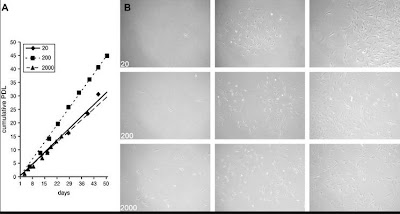Plating density (number
of cells per volume of culture medium) plays a critical role for some
cell types. For example, a lower plating density makes granulosa cells
exhibit estrogen production, while a higher plating density makes them
appear as progesterone-producing theca lutein cells.
 Cells can be grown either in suspension or adherent cultures. Some
cells naturally live in suspension, without being attached to a surface,
such as cells that exist in the bloodstream. There are also cell lines
that have been modified to be able to survive in suspension cultures so
they can be grown to a higher density than adherent conditions would
allow. Adherent cells require a surface, such as tissue culture plastic
or microcarrier, which may be coated with extracellular matrix
components to increase adhesion properties and provide other signals
needed for growth and differentiation. Most cells derived from solid
tissues are adherent. Another type of adherent culture is organotypic
culture, which involves growing cells in a three-dimensional
(3-D) environment as opposed to two-dimensional culture dishes. This 3D
culture system is biochemically and physiologically more similar to in
vivo tissue, but is technically challenging to maintain because of many
factors (e.g. diffusion).
Cells can be grown either in suspension or adherent cultures. Some
cells naturally live in suspension, without being attached to a surface,
such as cells that exist in the bloodstream. There are also cell lines
that have been modified to be able to survive in suspension cultures so
they can be grown to a higher density than adherent conditions would
allow. Adherent cells require a surface, such as tissue culture plastic
or microcarrier, which may be coated with extracellular matrix
components to increase adhesion properties and provide other signals
needed for growth and differentiation. Most cells derived from solid
tissues are adherent. Another type of adherent culture is organotypic
culture, which involves growing cells in a three-dimensional
(3-D) environment as opposed to two-dimensional culture dishes. This 3D
culture system is biochemically and physiologically more similar to in
vivo tissue, but is technically challenging to maintain because of many
factors (e.g. diffusion).
No comments:
Post a Comment